Stochastic Oscillator Analysis & Stochastic Oscillator Signals
Developed by George C. Lane
The Stochastic Oscillator is a momentum indicator - it shows the relation between the current closing price relative to the high & low range over a given number of n periods. Oscillator uses a scale of 0-100 to draw its values.
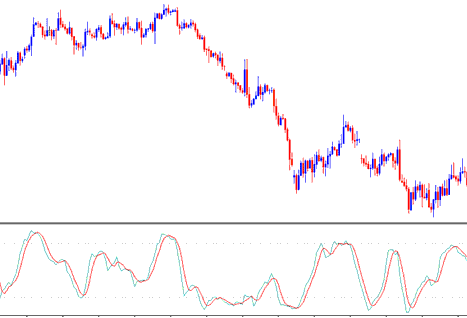
This Oscillator is based on the theory that in an up trend market the price closes near the high of the price range and in a downwards trending market the price will close near the low of the price range.
The Stochastic Lines are drawn as 2 lines- %K and %D.
- Fast line %K is the main
- Slow line %D is the signal
3 Types of Stochastics Oil Oscillators: Fast, Slow and Full Stochastics
There are Three types are: fast, slow and full Stochastic. The 3 indicators look at a given chart period for example the 14-day period, & measures how the price of today's close compares to the high/low range of the time period that is being used to calculate the stochastic.
This oscillator works on the principle that:
- In an upward trend, crude price tends to close at the high of the candlestick.
- In a downwards trend, crude price tends to close at the low of the candlestick.
This indicator shows the momentum of the trends, & identifies the times when a market is overbought or oversold.
Crude Oil Analysis & Generating Trade Signals
The most common techniques used for analysis of Stochastic Oscillators to generate signals are cross overs signals, divergence signals and over bought oversold areas. Following are the techniques used for generating trade signals
Oil Cross Over Trade Signals
Buy signal - % K line crosses above %D line (both lines moving upwards)
Sell signal - %K line crosses below the %D line (both lines moving downwards)
50-level Crossover:
Buy signal - when stochastic lines cross above 50 a buy crude trade signal is generated.
Sell signal - when stochastic lines cross below 50 a sell crude trade signal is generated.
Divergence Crude Oil
Stochastic is also used to look for divergences between this indicator and the price.
This is used to determine potential trend reversal signals.
Upwards/rising trend reversal- identified by a classic bearish divergence
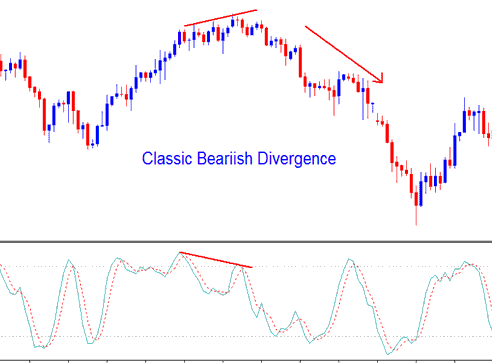
Trend reversal - identified by a classic bearish divergence
Downwards/descending trend reversal- identified by a classic bullish divergence
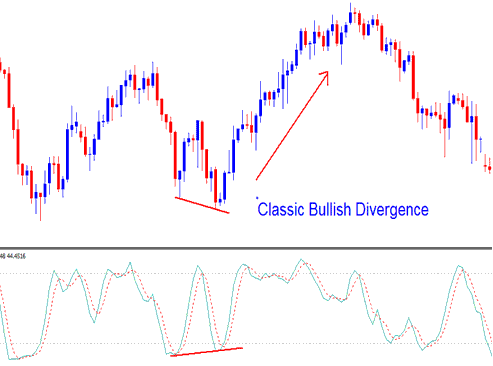
Trend reversal - identified by a classic bullish divergence
Oversold/Overbought Levels on Indicator
Stochastic is mainly used to identify potential overbought & oversold conditions in price movements.
- Overbought values greater than 70 level - A sell signal occurs when the oscillator rises above 70% and then falls below this level.
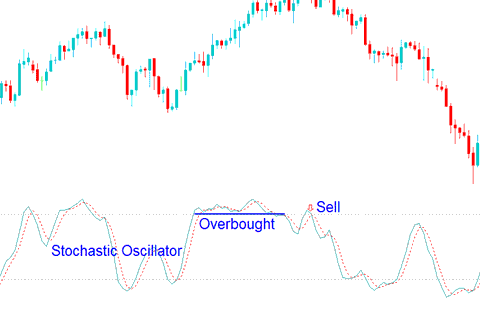
Overbought - Values Greater 70
- Oversold values less than 30 level - a buy signal is generated when the oscillator goes below 30% and then rises above this level.
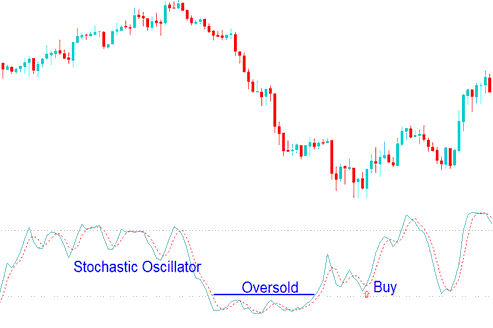
Oversold - Values Less Than 30
Trades are generated when Stochastic Oscillator crosses these levels. However, overbought/oversold levels are prone to whipsaws especially when the market is trending upward or downward.




